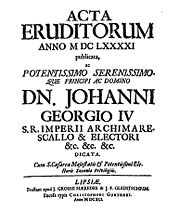
Johann Friedrich Gleditsch
Encyclopedia

Leipzig
Leipzig Leipzig has always been a trade city, situated during the time of the Holy Roman Empire at the intersection of the Via Regia and Via Imperii, two important trade routes. At one time, Leipzig was one of the major European centres of learning and culture in fields such as music and publishing...
) was a major book publisher in the late 17th and early 18th centuries.
Early career
Gleditsch was born in Eschendorf, near PirnaPirna
Pirna is a town in the Free State of Saxony, Germany, capital of the administrative district Sächsische Schweiz-Osterzgebirge. The town's population is over 40,000. Pirna is located near Dresden and is an important district town as well as a Große Kreisstadt...
, on 15 August 1653, son of pastor Georg Gleditsch (1615-65) and his wife Catherine (née Nikolai, 1624-1671).
After his father died when he was young, he attended the Thomas School in Leipzig.
For financial reasons, he began to work for Elert Schumacher, a bookseller in Wittenberg
Wittenberg
Wittenberg, officially Lutherstadt Wittenberg, is a city in Germany in the Bundesland Saxony-Anhalt, on the river Elbe. It has a population of about 50,000....
, working as an assistant there until 1680.
In 1681 he joined the publishing business of the late John Frederick Fritsch, whose widow Catarina Margaretha he married in November 1681.
In the following years he developed the already prestigious company into a prominent scientific publisher, famous mainly for the publication in Leipzig of the Acta Eruditorum
Acta Eruditorum
Acta Eruditorum was the first scientific journal of the German lands, published from 1682 to 1782....
. He brought out the first issue of this work in cooperation with the great Erben publishing house in 1682.
Independent publisher
At the end of 1693 Gledistch handed the business over to his stepson, Thomas Fritsch, and founded his own publishing bookshop.Within a few years this enterprise became important as well, excelling in lavish publications.
These included the main history of the Reformation, Seckendorff
Veit Ludwig von Seckendorff
Veit Ludwig von Seckendorf , German statesman and scholar, was a member of a German noble family, which took its name from the village of Seckendorf between Nuremberg and Langenzenn....
's Commentarius de Lutheranismo, Ziegler's Schauplatz und Labyrinth, Lohenstein
Daniel Casper von Lohenstein
Daniel Caspar , also spelled Daniel Casper, and referred to from 1670 as Daniel Caspar von Lohenstein, was a Baroque Silesian playwright, lawyer, diplomat, poet, and chief representative of the Second Silesian School.-Family:The Casper and/or Caspar family came from the Brieg principality, first...
's Arminius and the major biblical and theological works of Johann Tarnow (Tarnovius), Salomo Glassius
Salomo Glassius
Salomo Glassius was a German theologian and biblical critic born at Sondershausen, in the principality of Schwarzburg-Sondershausen.In 1612 he entered the University of Jena. In 1615, with the idea of studying law, he moved to Wittenberg. In consequence of an illness, however, he returned to Jena...
, Benedikt Carpzov der Jüngere and Valerius Herberger
Valerius Herberger
Valerius Herberger was a German Lutheran preacher and theologian.-Life:He was born at Fraustadt, Silesia . He studied for three years at Freystadt in Silesia , and then entered the University of Frankfort-on-the-Oder...
.
Gledistch and his brother Johann Ludwig, stepfather of Moritz Georg Weidmann (1686 - 1743)
Moritz Georg Weidmann (1686 - 1743)
Moritz Georg Weidmann was a German bookseller and publisher based in Leipzig, accredited to the courts of Poland and the Electorate of Saxony.He was the son of the Moritz Georg Weidmann Senior...
, persuaded the leading Dutch booksellers to send their works to the Leipzig fair instead of to Frankfurt, a major breakthrough for the book trade in the city.
In addition to the great authors, Gleditsch achieved success in the two key growth sectors of the book market of the early 18th Century: encyclopedias and journals.
He published John Huebner's Reale Staats-und Zeitungs-Lexicon (States and places lexicon) (1704), which with a supplementary volume published in 1712 became the indispensable reference when reading to the newspapers.
It allowed people to look up places and countries that were named without explanation in the papers, as was the convention of the day.
From the encyclopedias of Gottlieb Siegmund Corvinus (alias Amaranthe), he compiled the Woman's Lexicon (1715).
Among the journals he published Acta Eruditorum in Latin, supplemented in 1712 by the German Acta Eruditorum, from which the leading review of historical writings developed.
Gleditsch's companies created their synergy effects. Books published by the Gledisch were often discussed and promoted by his journals.
Further reading
- Benjamin Wedel, Geheime Nachrichten und Briefe von Herrn Menantes Leben und Schriften. (Cöln: Oelscher, 1731)
- Johann Goldfriedrich: Geschichte des Deutschen Buchhandels, 2. Bd. (1648-1740)

